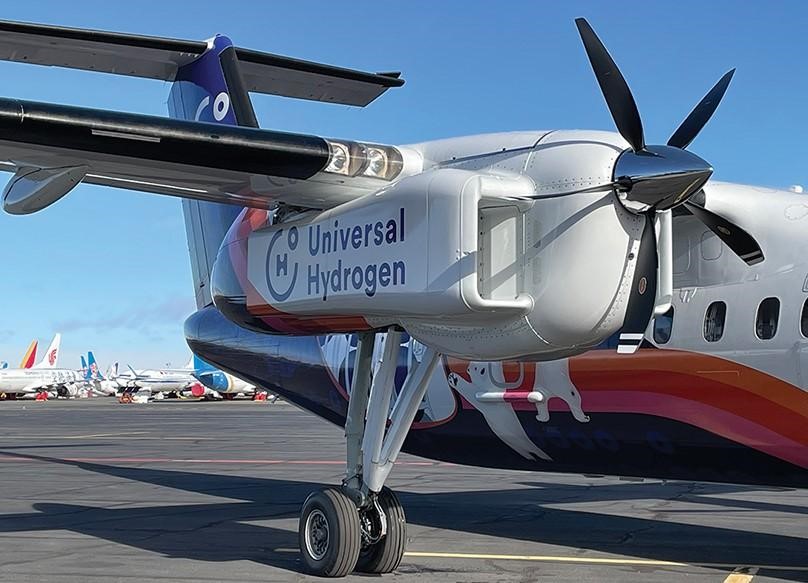
In the aviation industry’s pursuit of green flying technology, hydrogen is emerging as a promising source of carbon-free, lightweight, and relatively affordable energy. In April 2023, Universal Hydrogen reached a major milestone with the first successful flight of a 40-passenger regional airliner using hydrogen fuel cell propulsion.
Universal Hydrogen’s De Havilland Dash 8-300 hydrogen fuel cell-powered testbed, fondly nicknamed Lightning McClean, flew for 15 minutes, reaching an altitude of 3,500 MSL. Conducted under an FAA Special Airworthiness Certificate, the historic flight was the first in a two-year flight test campaign expected to culminate in 2025 with entry into passenger service of ATR 72 regional aircraft converted to run on hydrogen.
Watch the exciting lead up and takeoff for the first test flight here:
Instead of developing an entirely new airplane, this project used an aftermarket retrofit conversion kit to fly the Dash 8 on hydrogen. In this first test flight, one of the airplane’s turbine engines was replaced with Universal Hydrogen’s fuel cell-electric, megawatt-class powertrain. The other remained a conventional turbine engine for safety of flight.
Universal Hydrogen’s powertrain was built around Plug Power’s ProGen family of fuel cells specially modified for aviation use. Rather than using a battery, the fuel cells drive a modified magni650 electric propulsion unit directly, reducing weight and cost.
Hartzell Propeller partnered with the Universal Hydrogen team as part of our ongoing investment in future new aircraft design opportunities for the advanced air mobility and electric/hybrid aviation market.
Universal Hydrogen’s innovative powertrain utilized a 91-inch diameter five-blade swept airfoil carbon fiber Hartzell propeller that was designed and tested for the experimental aircraft. This propeller utilized derivative blades, hub and retention components from an existing CFR Part 35 certified propeller.
The specially designed Hartzell propeller provided thrust to keep the aircraft airborne when the other jet fuel-powered turbine engine was throttled back during the first flight to demonstrate cruise principally on hydrogen power. Hartzell also customized a governor for Universal Hydrogen and continues to develop governor advancements for green-powered aircraft.
“The airplane handled beautifully, and the noise and vibrations from the fuel cell powertrain are significantly lower than from the conventional turbine engine,” said Alex Kroll, Chief Test Pilot for Universal Hydrogen.
In the emerging world of green hydrogen-powered flight, this initial test flight shows promise. According to Universal Hydrogen, hydrogen will be at cost parity with jet fuel starting in 2025, with costs decreasing exponentially. Because hydrogen is made from water and its only emission is water, it is a true zero-carbon fuel.
By providing both an aircraft conversion solution for the existing fleet and a fuel services offering directly to regional airlines, Universal Hydrogen aims to be in passenger service with zero emissions by 2025 and in cargo service shortly thereafter.
“This project with Universal Hydrogen is one of many programs where Hartzell Propeller is working with and supporting advanced air mobility manufacturers,” said Hartzell Propeller President JJ Frigge. “Hartzell Propeller has been around for over a hundred years, and carbon-free flight can power our next century.”
Are you working on an Advanced Air Mobility or electric/hybrid aviation project? We’d love to hear about it! Hartzell Propeller’s technology is behind some of the world’s most revolutionary aircraft designs, and we’ve already provided test hardware on several innovative projects currently in development.
Fill out this short form to contact Hartzell Propeller’s Advanced Air Mobility Specialist, Mitch Heaton, and see how Hartzell Propeller can help you with custom propulsion systems and solutions.